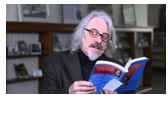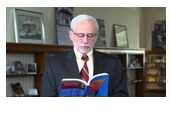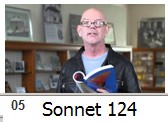| NOTE: Just
as Shakespeare's individual sonnets gain meaning from each other, so mine
are part of a whole, only more so, as they are arranged by parts of the
Mass and other contexts. Nonetheless, the indvidual sonnets should make
satisfactory sense, even if partial, on their own. The Notes do not appear
properly in this web presentation.
CONTEST SONNETS
14. Ad Astra
Speciosus forma prae
filiis hominum diffusa est gratia
in labiis tuis; propterea
benedixit te Deus in aeternum.
L’amour che muove il
sole e l’altre stelle.
IN my frail frame immortal love doth dwell;
and in these lines with borrowed breath you
live.
No skill can keep my body from death’s spell;
what skill I have doth life forever give
to you and me conjoined in sounds that they
shall speak who never knew us, though they gaze
long through the window of this page, and say
with wonder how we loved, in our brute age.
And yet no words I write
can e’er be true;
they all fumble, flunk, fall, deform, and fail
the infinite mystery that is you
and me, like calling minnow what is whale.
No lay can list to others
what is ours
though yet these rimes
might reach as far as stars.
Ad Astra: Latin, to the stars. The
first EPIGRAPH is the last line from Dante’s Divina Commedia, “the love
that moves the sun and the other stars.” Rumi wrote, “Love is the astrolabe
of the Mysteries of God” (Baldock, p181) ??The Sun?. The second is Pslam
44:3 in the Vulgate, 45:2 “You are the fairest of men; charm plays on your
lips for God has blessed you forever.” Frame: the human body, the framework
of a poem (as Shakespeare used the term), or the case or structure for
a window. A lay is a short lyric for a song; see the Frontispiece for the
tune for this sonnet. The word is often a pun. The language, style, and
theme of this sonnet imitates Shakespeare’s Sonnet 55 (and others like
17, 18, 60, 63, 65, 81, 101, 107, perhaps also like the pair of 59 and
106), and employs the Renaissance convention that poetry, unlike flesh,
is permanent. But this motif, that art survives the body, sometimes called
the monumentum trope, is not an ego�tistical claim so much as a tradition
originating with the classics, such as with Dante, Inferno 4.97, Ovid,
Amores 1.15.41, and Horace, Odes 3.30, which Shakespeare seems almost to
imitate: Exegi monumentum aere perennius — well, maybe some egotism. Some
have compared Shakespeare’s to Spencer’s Sonnet 32 in his 1591 The Ruines
of Rome, itself a translation from Joachim du Bellay, 1553 Antiquit?s de
Rome. Some of the poetic devices ?Ad Astra? employs are illustrated in
the ? Introduction to this book under ? 17. Window of this page: In Of
Grammatology (1967) Jacques Derrida writes “Il n'y a pas de hors-texte,”
which can be understood as saying that context is unavoidable. This poem
is paired with the following ?Acropolis Canon?.
15. Acropolis Canon
In fact, an absolute
innovation in music cannot be
anything else except
discordant, because it would be
unseemly to the general
custom. Even in poetry and prose,
that which is concerned
purely with harmony and melody
is almost not at all
susceptible of innovation.
THAT sonnet I wrote you in classic form —
each word joined, torqued down neat, precise, and
tight-
bolted, yoked, jigged, braced, shimmed and shaped
to norm,
soldered smooth, fittings strong yet quite polite
—
would, if one tooth chipped, if one gear slipped,
ex-
plode! not passion, mere paroxysm, but
detonation turning temples into wrecks;
and balanced gods would shake and strut.
The engine of my verse
I give to you,
whose temple trains my spirit, tracked, a plower
uncontrolled, yet embedded, motored true.
Round column caliber rests rise with power.
On canon’s rails I did
a sonnet sire;
in death I lie for love
without desire.
The EPIGRAPH is from Giacomo Leopardi,
Zibaldone, October 9, 1821, quoted in Charles Rosen, 1997 ex�panded edition,
The Classical Style: Haydn, Mozart, Beethoven. This sonnet, a palinode,
is paired with ?Ad Astra? and reacts against it to make one larger statement.
It heavily uses the 17th Century “metaphysical” technique of the “conceit”
with words used with multiple meanings. For example, in Shakespeare’s Sonnet
129, he punned spirit which I use in this sonnet with “sprit” — “sprit”
was slang for erect penis, dervied from the sense of the etymologically
related “sprout.” Another example: canon is (1) an ecclesiatical code,
(2) a basis for judgment as the rules of poetry, (3) the body of literature
considered the basis of a civilization or discipline, (4) a musical form
in which a melody overlaps itself in different voices or keys; a “cannon”
(suggested by rails and, in the line above, by caliber) is a weapon for
firing projectiles, in phallic shape. The Parthenon, which survived two
thousand years in good shape, was wrecked in 1687 by an explosion of the
powder stored in it by the Turks when a shell from a Venetian army hit
it. The couplet is discussed in the ? Introduction to this book, at the
end of ? 18.
16. Just Try To Kiss Me
Da mi basia mille, deinde
centum . . . .
JUST try to kiss me once again, just try,
or find out what I’m thinking, bother me
for slick massage, or
see a flick, or buy
us dinner, take a walk,
or make some tea,
repeat to me my veil theology
or politics or social
views or art,
or make and undertake
a liturgy,
or listen to you say what’s
in your heart.
Just try, and see if I resist your touch
or voice or gaze or pinch
or your sweet smell.
I yield already, and you
know as much,
if you should speak from
heaven or from hell.
And if you said that I should go away,
my faith in you’s complete
— I would obey.
The EPIGRAPH IS FROM Catullus 5. “Give
me a thousand kisses, then a hundred . . . .” Veil theology: “God veils
himself to reveal himself and reveals himself by veiling himself” —attributed,
perhaps mistakenly, to the mystic Suhrawardi (1155-1191) or Ibn Arabi (1165-1240).
One cannot see the sun by looking at it directly without harm because it
is too bright. But if it is veiled with translucent film, it can be seen;
optical aids enable viewing of even its flares and sunspots. Just so, reality
is beyond direct human apprehension, hidden within every event, within
every sight, sound, smell, taste, movement, thought. Nonetheless it is
through such veils that Reality is revealed to be beyond our comprehension
??Interbeing?. In Robert Cawdrey, 1604 A Table Alphabeticall, “theologie”
is described as “the science of living blessedly for ever.” “Theology is
— or should be — a species of poetry, which read quickly or encountered
in a hubbub of noise makes no sense. You have to open yourself to a poem
. . . . Like the words of a poem, a religious idea, myth, or doctrine points
beyond itself to truths that are elusive . . . .” —Karen Armstrong, 2004
The Spiral Staircase: My Climb Out of Darkness, 284. Kiss: The Christian
mystic Bernard of Clairvaux (1090-1153) wrote of various kinds of kisses
as approaches to the Divine ??The Kiss?. In De speculo caritatis St Aelred
(1110-1167), English abbot of Rievaulx, who especially loved the young
monk Simon, writes of “an intimate affection and the embrace of a holy
love, someone in whom your spirit can rest, to whom you can pour out your
soul, to whose pleasant exchanges, as to soothing songs, you can fly in
sorrow . . . with whose spiritual kisses, as with remedial salves, you
may draw out all the weariness of your restless anxieties” in Keith Sharpe,
2011 The Gay Gospels: Good News for Lesbian, Gay, Bisexual, and Transgendered
People, p105.
18. Bed Position
Non in mari tantum aut
in proelio vir fortis apparet;
exhibetur etiam in
lectulo virtus.
Kept wholly for himself
alone,
there he stayed sleeping,
and I caressed him.
She blew my nose and
then she blew my mind.
YOU don’t coax me to your bed, but say This
is where we’ll spend the night: stay your side
but first let’s cuddle. Curried, I don’t
miss
a spoon, so close we are I think I’ve died
and found a banquet, blessed beyond, where sex
is not an issue, though I once blurt out
(the word’s not ‘blurt,’ but blunt, though with
respects)
“What would making love to you be like?” Spout
— that’s the word. Nothing ever comes of it.
We sleep. My rest on knife edge makes straight
space.
You serve me as I am, and, lo! I fit
your life, though in your bed, no crumb, no trace.
The fork of night lifts day; you juxtapose
and cantilever love and grab my nose.
The first EPIGRAPH, “Not only at sea
or in battle is a man’s bravery displayed; courage is shown even in bed,”
is from Pseudo-Seneca, De remediis fortuitorum, 6.1 (Seneca lived 4 BCE–65;
Pseudo-Seneca probably dates from the 4th Century.) The second is from
John of the Cross, “Ascent of Mount Carmel” 1,13, tr E Allison Peers, 1953
The Complete Works of Saint John of the Cross, Vol 1, p59. The third, by
The Rolling Stones, is from the popular song, “Honky Tonk Woman.” Spout
is an erudite pun = sprit ??Acropolis Canon?. Other puns like straight
and the euphemism nose are obvious.
24. Passage
For relationships .
. . must be like islands, one must accept
them for what they
are here and now, within their limits —
islands . . . surrounded
and interrupted by the sea, and
continually visited
and abandoned by the tides.
I’VE come to this island where I don’t care
if you love me, though now I see your love
runs clear through me. What was my total fare
to this place? Well, I surrendered, above
all else, my rank tattered ticket to where
my clinging kept me from seeing who you
are, a pit I could not climb out of, snare,
delusions, dreams that never will come true.
We reach each other through the deep, through arm
and inlet, mouth, sound, sump, cove, bay and bight.
The rush and churn, the quiet sea brew’s barm,
the flood and drain are love’s career and rite.
O, something deeper than
the inflect sea
tips, changes, sips, and
bodies you and me.
The EPIGRAPH is from Anne Morrow Lindbergh,
1955 Gift from the Sea, p109. And even David Brooks writes, “life
comes to a point only in those moments when the self dissolves into some
task [I wish he had added, ‘or relationship’]. The purpose in life is not
to find yourself. It’s to lose yourself” (New York Times, May 31, 2011).
On the other hand, the complementary truth is that “If . . . I do not need
another in order to complete my own identity, I can see the other for what
he really is in himself rather than simply for what he is that corre�lates
to my own needs.” —Herbert W Richardson, “Three Myths of Transcendence”
in 1969 Transcendence, ed Richardson and Ronald R Cutler, p112. And Tom
Robbins, 2014 Tibetan Peach Pie, p126, writes “it’s a privilege to love
someone . . . ; and while it’s paradisiacal if she or he loves you back,
it’s unfair to demand or expect reciprocity. We should consider ourselves
lucky, honored, blessed that we possess the capacity to feel tenderness
of such magnitude and be grateful even when that love is not returned.”
A sump is a kind of pool of water. A bight is a curve or bend in the bank
or shore of a body of water, or the water thus embraced. Barm is the yeasty
froth or head on malt drinks like beer.
25. Wound Wick
The fire of the body
burns away its dross and, rising
in a flame of self-surrender,
consumes its own microcosm.
I WILL not possess you, or try, for I
desire you fierce alive; we two are both
possessed by friendship’s fires which purify
all selfish frames and fences. So my oath
to you is ranging love, not caged display;
the flames within us, tongued, not fused, were
matched
at the birthing of the universe. Stay
with love’s consumption, not to me attached.
The candle cannot possess the burning,
though the turning fire sits in the wound wick;
in dark, light is found, as love in yearning,
and spirits dwell, not owning, stick with stick.
Since first we met, I
learned to let you go;
yet in my wick the flames
you gave still grow.
The EPIGRAPH is from Dag Hammerskj?ld,
1964 Markings, English, p166. That book’s own epigraph is from Meister
Eckart: “Only the hand that erases can write the true thing.” Rumi writes,
“It is the burn of the heart that I want. It is this burning which is everything
— more precious than a worldly empire — because it calls God secretly in
the night.” —Rumi/Star, p152 ??The Sun?. Birthing of the universe:
“This universe, which is the same for all, has not been made by any god
or man, but it always has been, is, and will be an ever-living fire, kindling
itself by regular measures and going out by regular measures.” —Heraclitus
fragment 30. Candle: “A candle in the thighs / Warms youth and seed and
burns the seeds of age . . . .” —“Light breaks where no sun shines,” 2d
stanza, Dylan Thomas (1914-1953). Yearning: Compare the hadith ??Al-Fatiha
+ The Pupose of Sex?, “I was a hidden treasure and I yearned to be known.
Then I created creatures in order to be known by them” with this passage
from Episcopalian priest Carter Hayward, 1984 Our Passion for Justice;
Images of Power, Sexuality and Liberation: p49: “In the beginning was God.
/ In the beginning was the source of all that is / God yearning / God moaning
/ God laboring / God giving birth / God rejoicing / And God loved what
She had made / And God said / ‘It is good’ / And God knowing that all that
is good is shared / Held the Earth tenderly in Her arms / God longed to
share the good Earth, / And humanity was born in the yearning of God
. . . .”
29. Shakespeare’s Fair Young Man
For thy sweet love remember’d
such wealth brings
That then I scorn to
change my state with kings.
Shakespeare, abandonnant
du coup Oph?lia
Cord?lia, Desd?mona,
tout son beau sexe,
Chantait en vers magnificents
— qu’un sot s’en vexe —
Le forme masculine
et son alleluia.
I READ and feed on Shakespeare’s handsome verse
of love and verge toward you and feast. I
know
his relish matched with
appetency worse
than death, though on
his friend he could bestow
an immortality, so that I ask,
Would I prefer to greet
the Bard or meet
his young male friend,
behind time’s wordy mask?
These two: who made
the sonnets ripe and sweet?
If even in the smallest way, his friend
and you are like, then
let me meet this youth,
carousing you through
him, since you now wend
away from me, like shifting
hope to truth.
Unmeasured love with lingual palette knife
is diced and cooked and
dried by passion’s strife.
The first EPIGRAPH is the couplet
concluding Shakespeare’s Sonnet 29. Later sonnets com�plain of the youth’s
faithless, shallow, narcissistic character as Shakespeare also examines
his own faults in the relationship. The second EPIGRAPH is from Paul Verlaine’s
“? Ne Blaspheme Pas,” translated as “Shakespeare, forsaking Ophelia, Cordelia,
Desdemona, all that beautiful sex, sang to man’s form (though it may vex
stupid critics) many a Hallelujah” by J Murat and W Gunn in the 1979 A
Lover’s Cock and Other Gay Poems, p20. Puns include relish, meet and unmeasured.
Wend is now seldom spoken, but Shakespeare used it to mean go, as in proceeding
or pursuing a path. Diced is a term used in food preparation and gambling.
A palette is a painter’s board for mixing colors or an available range
of something, and the palate is the roof of the mouth. Cooked: “A successful
exercise in shacking up need not necessarily be any more improbable than
a successful vichyssoise.” —Episcopal priest Robert Farrar Capon, 1982
Beyond Noon and Three, p6.
30. Shakespeare’s 73 Redux
THAT time of year thou mayst in me behold
when daffodils sing zeal to greet the sun
whose muscled, sweating rays make time more bold,
and rouse the gardened loins where glory’s spun.
In me thou see’st the
playing of such day
as brings the birds to greet in themes of cheer,
lifts beasts from slumb’ring earth to groom and
lay,
and makes the humblest hiker a vizier.
In me thou see’st the
burning of such fire
as promises a blaze that sizzles awe,
a sacred consummation of desire
constrained by courtesy and holy law.
This thou perceivest,
which makes thy love more strong,
and made old me now young
with sursum song.
Shakespeare’s Sonnet 73:
That time of year thou
mayst in me behold
When yellow leaves, or none,
or few, do hang
Upon those boughs which shake
against the cold,
Bare ruined choirs where late
the sweet birds sang.
In me thou see’st
the twilight of such day
As after sunset fadeth in the
west,
Which by and by black night
doth take away,
Death’s second self, that seals
up all in rest.
In me thou see’st
the glowing of such fire
That on the ashes of his youth
doth lie,
As the death-bed whereon it
must expire,
Consumed with that which it
is nourished by.
This thou
perceivest, which makes thy love more strong,
To love
that well which thou must leave ere long.
Lay can be a vulger term for sexual
activity. A vizier is the title given to a minister of state in some Muslim
countries. Sursum: sursum corda, “Lift up your hearts” — a part of the
Eucharistic Prayer, sometimes chanted.
39. Carpe Diem
Tu ne quaesieris, scire
nefas, quem mihi, quem tibi
finem di dederint .
. . . Dum loquimur, fugerit invida
aetas: carpe diem,
quam minimum credula postero.
SARGON’S name lives on, but who knows Sargon?
He’s dead, though deeds still make us who
we are.
Except for you, I’d be like Babylon.
And even you, immortal friend, time’s star,
will fade as time so finely mixes all
flesh back to dust, and light compacts and falls
into itself, Big Crunch, Big Bang, time’s wall
against itself, which beautifies, then mauls.
Ere then to know you full is my desire,
in all your loveliness and grace and power,
you showing resurrection, whole, entire,
each wound healed, transformed, soiled seed to
flower.
Dance, then, Shiva, dance! consume me with your
play!
Let your release, not rot, end this brief day!
Carpe diem, “seize the day,” is a
phrase in the last line of the 11th poem of the 1st book of the Odes of
Horace (65-8 BCE). The EPIGRAPH is from the beginning and ending of the
poem, which warns against Babylonian augury. The Latin quoted can be rendered,
“Don't ask (taboo to know) what the gods have planned for us. . . . While
we chat, jealous time has slipped away. Grab each moment, counting on little
to come.” Sargon seized the throne of Assyria in 722 BCE, captured
Samaria, supressed a revolt in Palestine, and defeated the Egyptians. He
was murdered in 705. He took his name from a Babylonian king who ruled
about 2,000 years earlier. Our world might be quite different if he had
not lived. One theory of the universe proposes that matter will eventually
fall together into something like a “black hole” from which even light
cannot escape, the Big Crunch, followed by an explosion, the Big Bang,
and expansion. (Another theory proposes that the universe expands forever.)
Shiva ??Ahimsa? is one of the most important Hindu gods. One favorite image
of him is as Nataraja, Lord of the Dance, surrounded by a ring of fire,
suggesting cosmic cycles of creation and destruction. Play: ??Thanks
for Noticing?.
58. The Plan
Whoever can evade the
Self transcends
The world and as a
lover he ascends.
Dein ist mein Herz und
soll es ewig bleiben.
THOUGH you are far and in another’s arms,
my love will never flicker, pale, or fade.
The sun may dim and disregard all charms
and earnest prayers, but I cannot be swayed.
The sky itself with all its stars made black
would stop the bend and dance and wave of space,
God’s brightest heaven turned to blindest lack
before my love would vanish or debase.
This habit I have formed of loving you,
of saying Yes to that On light you are,
inflects the Power from which the cosmos grew,
as you’ve become for me an avatar.
These forty years the
flame you lit flares still
as darkness yields to
love, and always will.
The EPIGRAPH is from the 1984 Afham
Darbandi-Dick Davis translation of The Conference of Birds by Farid ud-din
Attar (1145?–1221?). The second, Yours is my heart and so shall it remain
forever, is from the poem “Ungeduld” by Johann Ludwig Wilhelm M?ller (1794-1827),
and whose son, Friedrich Max M?ller (1823-1900) advanced the study of world
religions), used by Franz Schubert (1797-1828) in his song cycle, Die sch?ne
M?llerin. Stars made black: Some cosmologies anticipate that stars will
eventually become black holes. In Hinduism, an avatar is a manifestation
of a deity in flesh. The sky . . . space plays with Einstein’s theory of
General Relativity which predicts “black holes,” the bending of light and
the curvature of space-time by gravitational fields, and time dilation.
Forty: four is the largest number most people can perceive without counting;
ten is a base that multiplies that sense of size; forty is used by Abrahamic
writers to mean many but finite, as in the forty days and nights of the
Noahide Flood, the forty years of Israelites wandering in the desert, the
forty days Jesus fasted in the desert before his temptation, the forty
days designated as Lent, forty-day fast in the cave of Muhammad (pbuh),
and the reckoning that Muhammad was forty years old when the revelations
from God through Jabril (Gabriel) began.
63. Conversion
When I make myself known
to you
beware of my torment
in your limbs —
have hope for a doubling
of my favor in honor of you.
WHICH life was it in which we had that fight?
So equal was our match that bets were made
we’d kill each other in the swaggering night —
both sweeping, patching, pounding as we prayed.
They wagered winner and
the length it’d last,
till from one spot we stretched at least the field;
with our own groans we tilled the crowd that massed.
For death they watched, or one of us to yield.
This life, in grip and
age unpaired, we greet,
though I still spy your biceps, now benign,
and gambling’s gone, compulsion to compete
expired, your soul converted to a shrine.
Now I admire what
once I feared and fought,
and photograph the
spirit that I sought.
The EPIGRAPH is from Kit?b al-Maw?qif,
#67, The Standing in the Presence Chamber and the Letter, by lesser-known
Sufi Muhammad ibn Abd al-Jabbar ibn al-Hasan an-Niffari. Niffari, probably
an Iraqi, died in 965 in Egypt, 1996 Early Islamic Mysticism, tr Michael
A Sells p296. Biceps: Alas, Kenneth R Dutton seems largely correct
to conclude his 1995 The Perfectable Body: The Western Ideal of Male Physical
Development by noting that “Unlike the centuries of widespread religious
faith, when the developed body could symbolically point to a transcendent
reality, our own age has retained the paradigmatic language of physical
perfectability but without any intimation of a higher reference . . . .”
p375. The Chinese col�lection at the Nelson-Atkins Museum of Art in Kansas
City, MO, includes a pair of fierce-looking earthenware wrestlers or acrobats
from the Wei Dynasty.
65. Poetic Failure
At non effugies meos
iambos.
THE sole true problem that presents to sleep
with you is that my splendid verse
about your smell, dark hide, the way you keep
me close, pet-pull me near, in night immerse .
. . .
These phrases pile up, crunch, they fade, and vanish
in every movement of each moment’s charm;
new pleasures break old wordings and soon banish,
a library ruined when you shift your arm.
Instead inscripted in my head is where
and how we cuddle, mudras made from your mute touch.
Each breath you take I cherish as my prayer,
each twitch a ritual ordaining much.
All metaphors real presence
overtakes:
no poems remain as morning
light awakes.
The EPIGRAPH, “You won’t escape my
verses,” is from Catullus fragment 3, used here with double irony. In Biblical
usage, sleep may mean resting in death and awake may mean revived from
the dead. Sole is a pun. Issue is sometimes used to mean “problem” or “dispute”;
but its primary meaning is putting forth, as in providing supplies or publication;
it can also mean the produce of sexual union, as a child or an artistic
or spiritual effort. Mudras are sacred gestures. Breath: Breathing is often
associated with the sacred. “Are you looking for me? . . . You will not
find me in stupas, not in Indian shrine rooms, nor in synagogues, nor in
cathedrals. . . . You will find me in the tiniest house of time. Kabir
says: Student, tell me, what is God? He is the breath inside breath.” —Kabir
(1440-1518, whose writings appear in the Sikh holy book, the Adi Granth)
in Stephen Mitchell, 1989 The Enlightened Heart, p72, tr Robert Bly. Related
is spirit, which in English and many other languages is etymologically
related to breathing, as in inpiration. “Ritual . . . is the place
where meaning occurs. Saying ‘I love you’ to an intimate other is indeed
a ritual, but it contributes more than we imagine to maintaining the meaning
of the intimate relationship, just as the ritual of reciting the Lord’s
Prayer reiterates the meaning of our worship of God. These ritual moments
don’t tell us anything about specifics, but they remind us of the whole
in which all specifics make sense. In an information culture, where only
what is new and what is useful is interesting, ritual is incomprehensible.”
—Robert Bellah, 2006 The Robert Bellah Reader, p493-4. Real presence refers
to the doctrine that Christ is truly present in the consecrated bread and
wine of the Eucharist. “What is clear and concise can’t deal with reality,
for to be real is to be surrounded by mystery.” —Attributed to James Joyce
in John Cage, 1983 X: Writings ’79–’82, p54.
68. Meridian
Zwei Seelen wohnen,
ach! in meiner Brust.
THE King of Days will dance before my throne.
We both are regal but of different realms.
The heart I rule, and
he commands the bone,
this ship of being ordered
from two helms.
His stately dance turns frantic and I spin
to see him grappling with
the wheel of time.
It starts and stops, a
compass to begin
again go tacking to and
fro to prime.
Exhausted, he leaves me thus spent and flees.
(In hiding kings must
sometimes secret go.)
When he returns, with
health or with disease,
his dance may honor me
or overthrow.
Is he at fault? No, him I love complete:
so fascinating are his
fitful feet.
The EPIGRAPH, “Two souls, alas, dwell
within my breast” is from Goethe’s Faust (Part I) as Faust converses with
Wagner as they walk outside the city gate on Easter Day. The dancing King
of Days refers to both to Mahakala, a Tibetan Buddhist form of the Hindu
god Shiva ??Ahimsa? combining a sense of time with death. Here he is homologized
with the wrathful Yama who holds the wheel of time or the “wheel of life,”
a mandala of samsara depicting the twelve co-originations and the six karmic
regions in Tibetan Buddhist thought. Bud�dhist deities may be understood
more as psychological tendencies or capacities rather than objective entities
existing apart from the mind. The helm is the device by which a ship is
steered. A compass is a navigational device for finding direction; like
a wheel or mandala, the device is usually round; the word also means perimeter
or scope; it is also an instrument for drawing circles. Tacking is the
directing of a sailing vessel with reference to the wind. Among the many
meanings of prime as a verb and a noun is the prime meridian, 0 degrees
longitude, which, with its opposite, divides the world into two hemispheres;
the prime running through Greenwich, England, by which a system of international
time reckoning was established in 1884.
82. Easter Morning
kai tacu poreuqeisai eipate
tois maqhtas autou oti hgerqh
apo twn nekron, kai idou
proagei umas eis thn galilaian,
ekei auton oyesqe: idou eipon
umun . . . . kai idontes auton
prosekunhsan, oi de edistasan.
I — CALLED atheist by those who love hate
(although they claim that they alone are
heirs
to Resurrection, say I
desecrate
their own faith when I
make embracing prayers) —
see Easter glory! I’m a witness! Watch
the promise raveling in
spring’s wet ground!
in wind! in sun’s bright
sky! and juice’s crotch!
These tales eternal, soil
and soul, astound!
Disciples scattered, some afraid to show,
now gathered, warmed from
mourning, love from woe,
the power of sin and death
itself reversed,
redeeming history’s night
of its worst.
Through time a wonder, God or not, has stood
when even evil will ordain
the good.
The EPIGRAPHS are from Matthew 28:7
and 17: “He has been raised from the dead and is go�ing on before
you into Galilee; there you will see him. . . . When they saw him,
they fell pros�trate before him . . . .” Atheist, like God, is a multivalent
term. Here it means the denial of a Supreme Being. For many mystics God
can mean simply Reality, as suggested by the Sanskrit term sat (truth,
reality), the Arabic al-Haqq (the Muslim mystic Hallaj was killed for blas�phemy
when he applied the term to himself), the Hebrew Yahweh (I am that I am,
or I will be what I will be, understood by some to be a personification
of all that was, is, and will be), the Infinite of Cusanus, akin to the
Interbeing of Thich Nhat Hanh and the Dharmakaya (truth-body, reality)
of other Buddhists out of which the Buddha appears, and even the Ground
of Being of Paul Tillich. Such views are much closer to Process theology
(Whitehead, Hartshorne, even Teilhard) than God as a Super-Douper Entity.
Easter morning accounts in the four Gospels vary. Easter is the spring
Christian celebration of the risen Christ after his cruci�fixion and death.
John Shelby Spong writes that Matthew (and Paul) view the resurrection
as “an act of lifting Jesus from death into the meaning of the living God,
not as an act of resuscitating Jesus” in his 2002 A New Christianity for
a New World, p103. The word Easter ap�pears to derive from Old English
?astre and related to east and the German pagan goddess Ostern; estrus
from the Latin oestrus may be a similar formation. The usual rime pattern
is replaced by coup�lets in the third quatrain. (Shakespeare’s 126 is all
couplets.)
88. Love Locket
Omnia vincit amor; et
nos cedamus amori.
. . . Idem homo et saluatur
ex parte et condemnatur ex parte . . . .
THIS loud and too large love I have for you
I now reduce to this small, silent space,
and set it in a locket,
safe from view,
and wear it to confine
you to a place.
You overran my life and skinned my soul;
my strong physique became
a bag of woe;
your gravity made me a
damn black hole;
you made my moil a comic
video.
When rapture judges with the trumpet’s blare,
and when Maitreya stirs
within my breast,
when Emperors will bow
to South, aware,
or when Messiah comes
and gives us rest,
this locket forged on anvil from pure ire
will melt from love within,
and God’s desire.
The EPIGRAPH, “Love conquers all;
and we must surrender to love,” is from Book X of the Ec�logues by Virgil
(70 BCE-19 BCE). The second is from Commentary on Psalm 118, 20, 58 by
Ambrose of Milan (340?-397): the same person is at the same time both saved
and condemned. A black hole is often described as a space-time region so
dense that gravity prevents anything, including light, from escaping, although
recent theories suggest that information can be recovered. Moil: drudgery,
trouble. Some fundamentalist Christian eschatology posits a rapture in
which when the “dead in Christ” and those “who are alive and remain” are
“caught up in the clouds” (1 Thessalonians 4:17) to be eternally united
with Christ in his kingdom. In ancient Confucian thought, society would
be set right by imitating the reverence of the emperor honoring the gods
by bowing to the South where they reside. In some Buddhist eschatology,
the bodhisattva Maitreya is regarded as the future Buddha. My favorite
image of Maitreya in the Nelson-Atkins Museum of Art in Kansas City, MO,
is a nearly life-size Gandharan phyllite sculpture (3d Century). In some
Jewish eschatology, a Messiah will establish the rule of Israel to bring
peace to the world. Judges: Judgment Day ??Postmodern Faith? is the
time when the soul’s deeds are measured for reward or punishment in some
religions, including Judaism (Rosh Hashanah yearly, or at the end of time),
Christianity (the Last Judgment), and Islam (the Day of Reckoning). The
third quatrain can be compared and contrasted with Shakespeare’s Sonnet
55 which concludes, “So, till the judgment that yourself arise, / you live
in this, and dwell in lover’s eyes.”
93. Thin Veil
All the world’s a stage,
And all the men and
women merely players;
They have their exits
and their entrances;
And one man in his
time plays many parts . . . .
We are such stuff
As dreams are made
on, and our little life
Is rounded with a sleep.
Qual portento mi richiama
la mia mente a rischiarar?
IT is so thin, this veil between the dream
and what, deceived, we call our waking state;
unconscious, we paint flats, we fabricate
(from fear and wish) an organizing scheme,
a pattern to make sense, a common theme
to comfort and explain what some call fate
in politics, career, and how we mate,
though Will, the free mind’s mantra, reigns supreme.
So I met you, loved you, constructed you
within my lone streamed soul; but now I scream
— Crap! who or what will I next dare create? —
and worry how to right what is askew,
how this fouled friendship’s
story to redeem
from evil done by both
our dreams, and wait.
Two EPIGRAPHS are from Shakespeare,
first Jaques in As You Like It, 2, 7, then Prospero in The Tempest, 4,
1. The third is from Handel’s 1735 Alcina, who bewitches those who come
to her island. When freed from illusion by a ring, Ruggiero sings, “What
magic can have returned the light of reason to my mind?” in 2.1, tr Harriet
Mason. Veil: ??Just Try To Kiss Me?. A flat is a (usually) rectangular
wooden frame covered with canvas painted to portray a backdrop scene as
part of a stage setting. A mantra is a sacred phrase for chanting to raise
or center one’s awareness; in a secular context, it is sometimes simply
a commonly repeated word or phrase, and sometimes implies shallowness of
thought. Fabricate has two common meanings: making and lying. This sonnet
uses a Petrarchan rather than Shakespearean rime scheme with a total of
only three end-rimes.
99. Fact or Fancy
Ay me, I fell, and yet
do question make
What I should do again
for such a sake.
Love often doesn’t arrive
at the right time
or in the right person.
It makes us do ridiculous
and stupid things.
But without it, life is just a
series of unremarkable
events, one after the other.
IF I find out you’ve used me all the while,
I’ll cry and grieve, all cleft, but own my
fault
I’ll not deny, to take for love your smile
in place, in time, in heft. I slay, assault
myself, not reading signs’ misprision, you
excused because your past still pains. Of course
mine twists and ruins a fresh convergence, too,
and residue adds piles to worn remorse.
But are you large enough for you to see
that I, this fool, will love to love’s extreme?
For my sake measures through infinity
to master even maya, the full-scale meme.
If fact or fancy, scatter
me in space;
and let your scheme be
shown as my disgrace.
The EPIGRAPH is from “A Lover’s Complaint”
(321-322), printed with Shakespeare’s Sonnets in 1609. The second is from
Meghan Austin’s 2015 April 2 “Modern Love” essay, “A Forbidden Relationship,
From the Other Side of the World” in The New York Times. Disgrace: see
Shakespeare’s sonnets 33, 34, and 59. Maya is a Sanskrit term used in Hinduism
and Buddhism; maya is described in many ways, including the illusory world
created by our desires and projections upon what is really real; we are
deceived as if by a magician, but we do not know we are deceived. A meme
is a theme, image, idea, style, or behavior imitated, reproduced, and sometimes
modified by personal transmission through cultural means, analogous to
genetic selection and mutation. The term, related to imitation and the
literary term mimesis, is thought to have originated by evolutionary biologist
Richard Dawkins in his 1976 book, The Selfish Gene. Now itself a meme,
the term is widely employed in sociology, political analysis, and other
fields.
101. Jesus Would Have Loved This
Man
I take for my love some
prostitute—
I pick out some low
person for my dearest friend . . . .
When a message from
the LORD came to Hosea,
the LORD told him,
“Go marry a prostitute . . . .”
YOU hustle me on Main Street and I say,
“I don’t buy sex.” You want to talk with me.
We sit as you tell stories. So I stay
relaxed with danger, crack, insanity,
your tries to get my cash. Yet I admire
your work, a kind of research which reveals
how others like their sex; your love for hire
displays their secret being, and it heals.
But I don’t buy. You ask me to your place
to spend the night, I say, “No sex.” We fix
your window, stuck. We cuddle, close, and trace
our tales. You wake. Say you, who pleasured six
times fifty women,
men a thousand three:
“I cannot sleep
if your skin touches me.”
The EPIGRAPH is from the 1860 edition
of Walt Whitman’s Leave of Grass ??Relaxed?. The second is from the Biblical
book of Hosea 1:2. Their secret being: “The ambiguity of the erotic vocabulary
of tantric literature cannot be too strongly emphasized. . . . Nevertheless,
maithuna [sexual union] is also practiced as a concrete ritual. By the
fact that the act is no longer profane but a rite, that the partners are
no longer human beings but ‘detached’ like gods, sexual union no longer
participates in the cosmic [mortal] plane. The tantric texts frequently
repeat the saying, ‘By the same act that cause some men to burn in hell
for thousands of years, the yogin gains his eternal salvation.’” —Mircea
Eliade, 1958/1969 Yoga: Immortality and Freedom, p263. A thousand three:
Whether the hustler was knowingly echoing “mille e tre” from Mozart’s Don
Giovanni was not clear.
104. Repair En Route
When a man can occupy
himself with counting syllables,
either he has not yet
attempted any spiritual climb,
or he is over the hump.
A perfect poem owes
its perfection to sounding the voice
of the heart and the
melodies of the conscience . . . ."
POETRY’S perfect once you gain control;
I can do almost anything
in verse.
I know each rime and foot
that measures soul,
expansive canons and expressions
terse.
In life you won’t surrender to my lust,
but in each gadget I make
love to you;
and while my yearning
soon will inform dust,
these lines will stay
and prove that I am true.
But all my skill won’t fix my wretched car
or get the parts it needs
when it breaks down,
or transport me to you
when I am far
in miles and meditation
from your town.
I’d give this perfect power I have away
for one deep kiss from
you I could obey.
En Route is a borrowing from the French
that means along the way. The EPIGRAPH is from W H Auden, 1964 Foreword
to the English version of Dag Hammerskj?ld’s Markings. The second is from
Fethullah G?len (1941-), 2010 Speech and Power of Expression: On Language,
Esthetics, and Belief. A foot is a unit within a line of poetry; it is
also called a measure. A canon is a standard for judgment, a standard collection
of texts, and the part of the Mass which includes the Consecration of the
bread and wine. Gadget: W H Auden calls a poem a “verbal contraption”;
see this book’s ? Introduction ? 19. Skill: “The skill taught by
God to the silkworm is a learning beyond the reach of the elephant” —Rumi/Star,
p176 ??The Sun?. Poetry: “The common prejudice that love is as common as
‘romance’ may be due to the fact that we all learned about it first through
poetry. But the poets fool us; they are the only ones to whom love is not
only a crucial, but an indispensable experience, which entitles them to
mistake it for a universal one.” —Hannah Arendt, 1958/1998 The Human Condition,
2d edition, p242 n81.
146. Monastic Exercise
For I impair not beauty
being mute . . . .
HE teases pious time with luscious porn.
He favors smiles and bodies ripe with drive,
though even in repose
with nothing worn
there is a beauty promised
to arrive.
Why porn? His muted life is in one cell,
companions gone and none
— not one — to come
and offer some relief;
though he can swell
like all those lads who
think age burdensome.
The oratory of the monk for prayer
or chapel or a shrine
to find one’s God
is where the soul, uncumbered
and laid bare,
can contemplate, commune,
and shoot its wad.
While others to this practice offer scorn,
like prayer or holy icon,
he lauds porn.
Monks are presumed celibate. Ignatius
of Loyola developed the Spiritual Exercises (1522-1524) used by the Jesuits
and widely adopted since. The EPIGRAPH is from Shakespeare’s Sonnet 83.
Porn in our culture is often controversial. It is widespread and much is
available without charge. Some say it invariably exploits the model; others
say it often benefits the model. What is erotic “art” to some is prurient
to others. Some say it leads the user to make models objects for sexual
gratification and atrophies the ability to make genuine human contact;
it can become addictive and replace “normal” human expectations with extreme
“kinks”; others say it can enhance sexual intimacy, and it is a good and
safe choice for those whose health, capacities, conditions, or situations
makes intimacy unwise or impossible. Porn users can feel shame, but — especially
among young people — it can be an expression of joy and wholesomeness.
Other cultures have portrayed gods and humans engaged in explicit sexual
activities — genital, oral, anal, intercrural, solitary and group sex on
temples and pottery, and in sacred literature and other artistic expressions
indicating spiritual values through such representations. Obscenity is
sometimes defined as that which arouses lascivious or lustful thoughts
or desires; but the human race and many relationships would disap�pear
without such desires. Our culture is affected by St Augustine’s conception
of sexuality whose holy purpose is not responsible pleasure but reproduction,
a conception probably imported into Christianity from Manicheanism. Defenders
of erotic material are unlikely to convince opponents even by quoting St
Paul, “I am absolutely convinced, as a Christian, that nothing is impure
in itself; only, if a man considers a particular thing impure, then to
him it is impure” (Romans 14:14) or Shakespeare, “Nothing is good or bad
but thinking makes it so” (Hamlet 2:2).
55. Granada:
Scale
. . . And to admire
The satisfaction of all true desire.
Tant?t la coup ou la bouche et tant?t le vase.
YOU dance flamenco in my ass;
ole!
You pause and pose, then
furious in your love
you fuck me fast like castanets
in play;
you consummate me, reigning
from above.
Both, man with man, so fully
male we know
just pride in yielding to
divine desire;
we spin and spend, in naked
vertigo,
this yearning as we burn
with Spanish fire.
O my Alhambra! endless tended
rooms
where God provisions intricate
delight,
danced passion cast, reflected
in these blooms,
scribed jewels by day, made
sacred flesh by night.
O rhythm’s root that turns me soaring wide:
You are the secret scale kings seek to hide.
The first EPIGRAPH
is from English poet and clergyman, Anglican saint Thomas Traherne (1638?-1674).
The second from Verlaine, “Sometimes in the mouth’s cup, sometimes the
vase,” in the translation of “Ces Passions” by J Murat and W Gunn (and
endorsed by Ned Rorem), 1979 A Lover’s Cock and Other Gay Poems, p55. Granada
is the city in Spain in which the Alhambra, one of the sprawling architectural
and landscaping wonders of the world, was built. Ol? is an Andalusian pronunciation
corrup�tion of Allah, the Arabic word for God. The paired last words of
the first line constitute a interlingual paronomasia. Fuck: ??Holy Words?.
“The two who are loyal to the Eros of dialogue, who love one another, receive
the common event from the other’s side as well, that is, they receive it
from the two sides, and thus for the first time understand in a bodily
way what an event is.” —Martin Buber, 1947/1965 Between Man and Man, p29,
tr Ronald Gregor Smith. Scale has many meanings, a few of which are a device
for weighing (as measuring the worth of precious metals), a progression
or gradation, a miniature model or representation, a musical range, and
an ascent (such as climbing a wall). Flamenco is a style of strongly rhythmic
music and dance, often with clapping, foot-stamping, shouts of Allay! (another
pronunciation of Ol?) and, nowadays, with castanets, that developed in
Andalusia and is often associated with the Romani people (Gypsies). Carlos
Saura’s 1995 movie, “Flamenco,” captures the Spanish mix of fervor and
form, abandonment and restraint.
124. Destiny
The young man looked at Jesus, loved him, and began
to beg to be with him. . . . He spent the night with him,
because Jesus taught him the mystery of God’s domain.
. . . Let the primal fire be revealed in the body’s games.
SUCK my cock, you young straight
stud; suck it good;
and lick my balls to
glisten in love’s fire;
turn me to your purpose — O Brotherhood! —
and fuck me with a saint’s precise desire.
Then I’ll fuck you until
you give me spill
again; I’ll push you to the edge of bliss
and then beyond, your fervent butt will fill
us with satori, ringent with a kiss.
Then you will know what men
as men can do,
and you and I will know what only God
can know about another’s flesh, a clue
to soul’s communion served from passion’s prod.
My offer you accept. Now
nude you stand.
You say this holiness is what Christ planned.
The EPIGRAPH
is from The Secret Gospel of Mark, verses 8 and 12. The Gospel, probably
used in Alexandria in the early years of the Second Century, was discovered
in 1958. Its authenticity has been challenged but studies like those done
by Biblical Archaeology Review 2009 Nov/Dec, Vol 35 No 6, suggest it is
genuine. The text is included in The Complete Gospels: Annotated Scholars
Version, 1992. The second is from Martin Buber, 1947/1965 Between Man and
Man, p28, tr Ronald Gregor Smith. Fuck: ??Holy Words?. Nude: “The head
Sublime, the heart Pathos, the genitals Beauty, the hands ? feet Proportion.
. . . Exu�berance is Beauty” —William Blake (1757-1827), The Marriage of
Heaven and Hell. Satori is a Japanese Buddhist term for Enlightenment,
the awak�ening from the cultural trance which prevents us from seeing reality
as it is; “Satori is the perception of Reality itself . . . .” —D T Suzuki,
1964 Introduction to Zen Buddhism, p 93 ??Don’t Ask + Even Zeus + Libation
+ Relaxed + Sacred Play + Status?. In Scivias, 2.6.14, Hildegard
of Bingen (1098-1179) writes that the soul, “which is invisible, invisibly
receives the sacrament which exists invisibly in that oblation, while the
human body, which is visible, visibly receives the oblation that visibly
embodies that sacrament.” While passion can mean sexual desire, in Christianity
it can mean the narrative of Christ’s suffering. Holiness: Many “churches
commit themselves to a completely other-worldly religion which made a strange
distinction between body and soul, the sacred and the secular.” —Martin
Luther King Jr, “Letter from a Birmingham Jail,” paragraph 32.
|













































